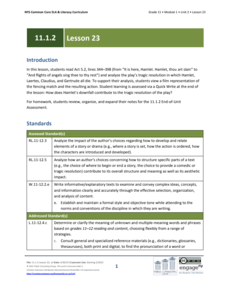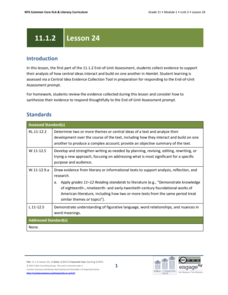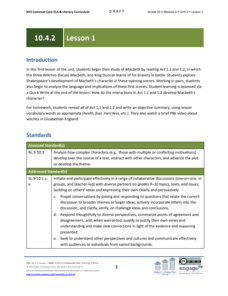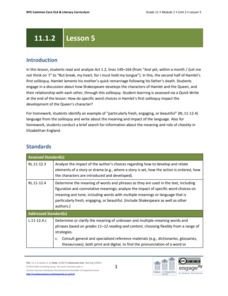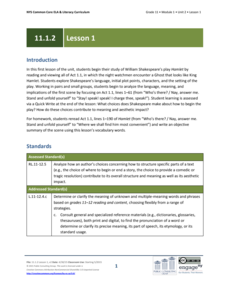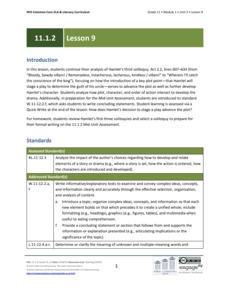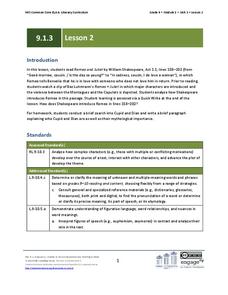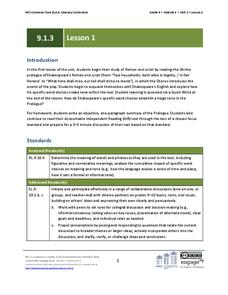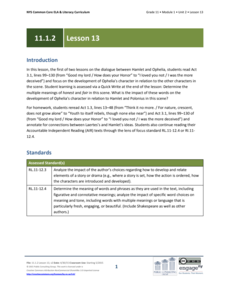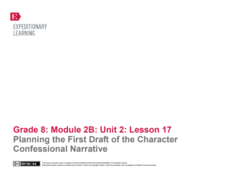EngageNY
Grade 11 ELA Module 1: Unit 2, Lesson 23
All's well that ends does not apply to Shakespeare's Hamlet. Scholars read Act 5.2 using the resource, discovering the play's tragic resolution. Pupils complete a Quick Write analyzing how Hamlet's downfall contributes to the play's...
Montgomery Public Schools
Romeo and Juliet Study Packet
William Shakespeare's Romeo and Juliet, a play about star-crossed lovers, resonates deeply with teenagers. The study packet contains study questions for each act of the play. Learners use a graphic organizer to analyze whether characters...
EngageNY
Grade 11 ELA Module 1: Unit 2, Lesson 12
How does Shakespeare develop the main ideas in Hamlet? Using the resource, scholars continue analyzing the famous monologue from the play. They identify a central idea from the passage and write to explain how it relates to other central...
EngageNY
Grade 10 ELA Module 4: Unit 2, Lesson 8
Shakespeare's Macbeth has something for everyone. Scholars complete a mid-unit assessment. They craft multi-paragraph essays to analyze how the author's structural choices create tension and suspense in the play's first two acts.
EngageNY
Grade 11 ELA Module 1: Unit 2, Lesson 24
How do central ideas build on each other in Shakespeare's Hamlet? Scholars begin the first part of an end-of-unit assessment. They complete a Central Idea Evidence Collection Tool worksheet to prepare for a writing activity to discuss...
EngageNY
Grade 10 ELA Module 4: Unit 2, Lesson 1
What do readers discover about a character within the first few sections of a text? Pupils begin reading Shakespeare's Macbeth and analyze the language in the first few scenes of the play. They also demonstrate understanding with a Quick...
EngageNY
Grade 11 ELA Module 1: Unit 2, Lesson 5
Scholars delve into Act 1.2 of Shakespeare's Hamlet. By completing a writing exercise and participating in a class discussion, they continue to analyze how the author develops the characters in the play.
EngageNY
Grade 10 ELA Module 4: Unit 2, Lesson 11
How does Shakespeare develop the idea of appearance versus reality in Macbeth? Using the resource, pupils discuss the plot in small groups. Scholars also complete a Quick Write analyzing how the interactions between Macbeth and Lady...
EngageNY
Grade 11 ELA Module 1: Unit 2, Lesson 1
How can an author's decisions impact a text? Using an insightful resource, scholars begin their study of Hamlet by reading Act 1.1. They explore the language, characters, and setting in small groups. Upon finishing group work, pupils...
EngageNY
Grade 11 ELA Module 1: Unit 2, Lesson 9
Hamlet has an unusual take on the criminal justice system when he decides to determine his uncle's guilt by staging a play. With the resource, scholars continue analyzing Hamlet's third soliloquy from Act 2.2 of Shakespeare's Hamlet....
EngageNY
End of Unit 2 Assessment, Part 1:Drafting the Argument Essay
An informative resource instructs pupils on how to write their essay drafts about the theme of control in Shakespeare's A Midsummer Night's Dream. Next, scholars complete an Exit Ticket, listing their three favorite characters from the...
Literacy Design Collaborative
Macbeth: Influence of Supernatural
Something wickedly wonderful this way comes in a lesson that focuses on Macbeth. After a close reading of the play, class members craft a literary analysis essay in which they use evidence from the text to show how Shakespeare uses the...
EngageNY
Grade 11 ELA Module 1: Unit 2, Lesson 2
What tools did Shakespeare use to develop his characters in the play Hamlet? With the resource, pupils engage in a discussion about how the character Claudius introduces and develops Hamlet. They explain how word choices in Claudius's...
EngageNY
Grade 11 ELA Module 1: Unit 2, Lesson 22
Scholars explore Act 5.2 of Shakespeare's Hamlet, in which Hamlet and Laertes injure each other with a poisoned blade. To finish the lesson plan, pupils also write about two central ideas from the play.
EngageNY
Grade 9 ELA Module 1: Unit 3, Lesson 2
After viewing a clip from Baz Luhrmann’s Romeo + Juliet in which major characters are introduced, and the violence between the Montagues and the Capulets is depicted, the class reads Act 1, Scene 1, lines 158-202. Groups then analyze the...
EngageNY
Grade 10 ELA Module 4: Unit 2, Lesson 10
Is it better to be dead than to "dwell in doubtful joy," as Lady Macbeth suggests in Act 3.2 of Shakespeare's Macbeth? Using the resource, scholars work in small groups to discuss how Lady Macbeth and Macbeth begin to unravel following...
EngageNY
Grade 10 ELA Module 4, Unit 2, Lesson 23
Withered, wild, and bearded are three adjectives that describe the Witches from Shakespeare's Macbeth. Scholars view paintings and discuss how different artists depict the witches. Pupils also complete a Quick Write to analyze Henry...
EngageNY
Grade 10 ELA Module 4, Unit 2, Lesson 26
How do directors' choices emphasize different elements of a drama? Scholars participate in a discussion about the Royal Shakespeare Company production of Macbeth and Akira Kurosawa's Throne of Blood. Finally, they write an analysis of...
EngageNY
Grade 10 ELA Module 4: Unit 2, Lesson 15
What goes around, comes around. Using the resource, pupils read Act 4.3 of Macbeth, in which Macduff and Malcolm plan to attack Macbeth. Scholars then hold a discussion and complete writing activities to analyze Shakespeare's structural...
EngageNY
Grade 9 ELA Module 1: Unit 3, Lesson 1
Class members begin their study of Romeo and Juliet by examining the words Shakespeare chooses in the Prologue to Act I to create the tragic tone of his famous play about star-crossed lovers.
EngageNY
Grade 9 ELA Module 1: Unit 3, Lesson 20
The final session in this 20-lesson plan unit asks individuals to use their Quick Writes, discussion notes, worksheets, and annotated text to craft and support a claim about how Shakespeare develops either Romeo or Juliet as tragic heroes.
EngageNY
Grade 11 ELA Module 1: Unit 2, Lesson 13
What impact does word choice have on character development? Using the resource, scholars read Act 3.1 from Shakespeare's Hamlet, focusing on the development of Ophelia's character. They also complete a Quick Write to analyze the meaning...
EngageNY
Planning the First Draft of the Character Confessional Narrative
Scholars read and analyze a model character confessional narrative to help guide their writing. Then, they plan the first draft of a character confessional based on Shakespeare's A Midsummer Night's Dream.
EngageNY
Grade 9 ELA Module 1: Unit 3, Lesson 17
Romeo and Juliet, Act 5, Scene 3, lines 139-170, is the focus of this day's lesson plan. Readers examine the dramatic irony in Juliet's comments and consider how "lamentable chance" caused by a "greater power" plays a role in the tragedy.


